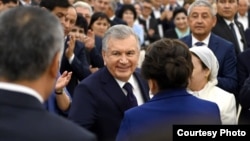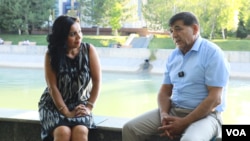TASHKENT, UZBEKISTAN - Confidence in the reform agenda of President Shavkat Mirziyoyev is at a low ebb in Uzbekistan ahead of an election Sunday in which the incumbent faces no real opposition and is expected to be returned to power with a huge majority.
With his limited steps toward greater openness and accountability, Mirziyoyev is still seen as an improvement over his post-Soviet predecessor, the autocratic Islam Karimov. But his 2021 pledge to keep the country “on a democratic path” was followed by constitutional changes that opened the door to Sunday’s snap election – and the formerly term-limited president’s eligibility for two more seven-year terms.
“People realize what is happening,” said Umidjon Mamarasulov, a blogger in Andijan. “But they seem too preoccupied with economic worries to do anything. Very little trust in elections in general, as the means for positive change.”
In pre-election interviews with VOA, many Uzbeks shared the sense that the ruling elite is unwilling to allow genuine political competition, and they have little hope the elections will be free or fair — something Uzbekistan has not witnessed since gaining independence from the Soviet Union in 1991.
“To date, the campaign has been low-key, mirroring lack of opposition to the incumbent,” said a June 26 statement from the Office for Democratic Institutions and Human Rights at the Organization for Security and Cooperation in Europe. It said the campaign has been focused on the economy, health care, education, water and the environment.
“We deserve better but who dares resist the leadership? This is where we’re stuck for now,” said Khatam, a voter in Tashkent. A cabdriver, he sees the public as “quite concerned about the future” but also fearful that opposition to the president would lead to social tension.
Selling homemade savories in Chorsu Bazaar, Nilufar Rashidova argued that if allowed, Uzbeks “can totally handle pluralism, and everything else that comes with more freedom.” She said she appreciated Mirziyoyev’s reforms but wished that “we had some real candidates in this election trying to win our trust and vote.”
Standing against Mirziyoyev are candidates representing three parliamentary factions: the Ecological Party’s Abdushukur Khamzayev, the People’s Democratic Party’s Ulugbek Inoyatov, and Robakhon Makhmudova from the “Adolat” Social Democratic Party.
But no one who spoke with VOA viewed any of them as a genuine rival to Mirziyoyev, who was nominated by the Liberal Democratic and the National Revival Democratic parties. None of the three has challenged the president or urged voters to choose himself or herself over Mirziyoyev.
Khidirnazar Allakulov has led the Truth, Development and Unity opposition movement for the last four years. He said he saw Khamzayev, Makhmudova and Inoyatov as “string puppets” who would not even debate among themselves, let alone against Mirziyoyev.
“They are the faces of this crooked establishment, tasked to validate its reforms, which are empty promises," he said. "Uzbekistan needs a real party reflecting the nation’s aspirations for freedom, integrity and prosperity.”
Allakulov’s group has twice been rejected registration by the Justice Ministry, which said the applicant failed to collect the required 20,000 signatures.
“We won’t give up,” said Allakulov. “Our countrywide network, led by women, is engaging the public, gathering support. No pressure, no harassment will stop us. We are taking this effort to ensure our children’s future. They must live in a better Uzbekistan.”
President's pledges
Mirziyoyev claims he is governing a “New Uzbekistan.” Campaigning region by region, he has pledged to create jobs, ease labor migration, build schools and hospitals, boost business and attract more investment. He vows to keep Uzbekistan open to the world and maintain balanced relationships with major powers and neighbors.
He also says he is committed to developing Karakalpakstan, an autonomous western region where at least 21 people were killed last July during protests over proposed changes to the constitution. A year later, Mirziyoyev has kept his promise not to change the republic’s “sovereign” status, but Tashkent notably ignored the anniversary of the killings.
Sixty-one Karakalpaks were convicted in connection with the protests this past year, after trials that rights groups criticized for lack of due process. No officers have been held accountable for killing protesters, and a report by a parliamentary commission — which authorities heralded as independent — remains unreleased.
Sources told VOA that following these elections, authorities plan to introduce another round of parliamentary elections, citing the new constitution as the reason.
Despite some improvements in society, Oybek Alijonov, a migrant worker-turned-blogger in Jizzakh, observed “continuous backsliding, eroding trust and deep cynicism towards the political system. People are not as optimistic as they seemed three, four years ago. I sense growing fear and corruption seems to be expanding day by day.”
Some say the Mirziyoyev of 2023 is not as democratically minded as he initially seemed. Others underscore that he is “the best option” Uzbekistan has.
Those who support Allakulov see Sunday’s vote as mere theater, predicting a manipulated turnout in which the president will be reelected by an overwhelming majority.
“I have never seen a free and fair election in Uzbekistan, and I’m over 80. We have never democratically elected any leader. I feel sorry for our people, but at same time, I question all of us for tolerating this for so long,” said Yuldash, who chose not to reveal his last name.
Better than predecessor
Still, many told VOA they vastly preferred Mirziyoyev to his predecessor, crediting the incumbent for caring about Uzbekistan’s future, even though, they said, the system he runs remains profoundly authoritarian and nepotistic.
Mothers from the Ferghana Valley, from where millions migrated to Russia and elsewhere over the years, said they wanted Mirziyoyev to improve the economy.
“Our kids should work at home, have opportunities for well-paid jobs here,” said Dilkhumor Kuchkarova, who has worked as a teacher for 40 years. Her sister Gulbahor Kuchkarova agreed, urging the authorities to serve the population’s needs.
Engineering student Renat Abdirayimov, 21, insisted that Uzbekistan was advancing despite enormous challenges.
"As a society, we are slowly yet steadily becoming more critical and demanding. … The nature of governance and elections will improve as we become more assertive and responsible as citizens,” Abdirayimov told VOA.
“This is not the same Uzbekistan I grew up in. We must enable ourselves to tackle our problems, instead of expecting others to solve them for us.”







